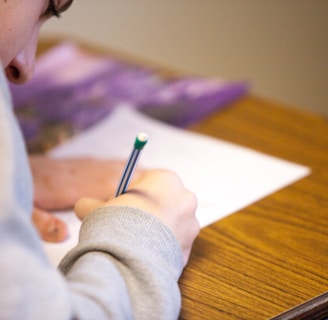Why I Almost Marched to My Principal’s Office Over Finals (And What Stopped Me)
Finals week: the phrase alone can strike fear into students and teachers alike. Stress. Deadlines. Pressure. But what if we’ve been looking at it all wrong? Whether you’re a teacher wondering how to make finals week more meaningful, or an admin looking to improve school culture, this piece offers a refreshing take on an age-old debate. Read this if you’re tired of finals week being the villain and are ready to turn it into one of your school’s most valuable assets.
LEADERSHIP
Jon Tomski
1/12/20252 min read


Finals Week-An Opportunity for Autonomy and Flexibility
It’s finals week. A week of high stakes, pressure, and studying for students, and a week of preparation, grading, and long hours for teachers. The idea of a final exam has become a four-letter word in many education circles. I used to be one of them. However, as I reflect on my time in education, I can't help but feel the opportunities that a more traditional final exam schedule offers our students and teachers.
It was around 2016—I'm not entirely sure of the exact year. I was teaching social studies and sitting in one of our dreaded staff meetings (I was, and still am, not a fan of staff meetings). My principal, whom I greatly respect and consider a fantastic leader, made what seemed to be an off-the-cuff decision in our meeting: to implement official final exams and a three-day alternate schedule in our building to accommodate them. Everyone must offer some sort of "final." Looking back, this was the only decision this man ever made that I vehemently disagreed with. It almost drove me to march down to the office to offer a piece of my mind. I didn't, and I offered a final. It wasn't the end of the world.
Fast forward to my current school and role. Experience has given me a completely different perspective on traditional final exams and "finals week." One of the greatest aspects of schools is the diversity of ideas, methods, and pedagogies inherent throughout the faculty. Our school offers a 3-day finals schedule, with "periods" ranging in length from 55 to 90 minutes. Our guidelines are very loose; the only requirement is that everyone must offer some sort of assessment. The results are a multitude of assessments and activities occurring throughout the building, spanning from traditional high-stakes exams, to presentations, personalized projects, and authentic assessments. This effectively blends old-school and new-school approaches, further enriching the diverse experiences offered to our students.
Flexibility in the schedule, autonomy for teachers, and diverse learning experiences transform an event with negative connotations, like "finals week," into a symbolic end to the semester accompanied by a variety of assessments for our students. This helps them become more well-rounded learners and problem-solvers while also allowing teachers to customize their assessments to the needs of their content, creating a greater sense of autonomy, efficacy, and fulfillment in their practice.
"Finals week" doesn’t have to deserve the negative connotation it often receives. Instead, like many components of modern education, it can be seen as an opportunity to improve student experience, foster teacher autonomy, and build a healthy school culture.
